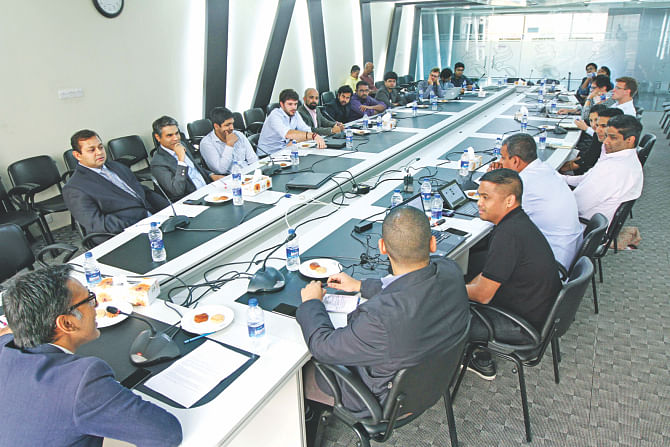Stand by start-ups with policy support: analysts

Friendly policies, tax breaks and a change in the educational curriculum and people's mindset are crucial to promoting start-ups in Bangladesh, young entrepreneurs said yesterday.
"There needs to be a fundamental shift in terms of how the academic structure is designed for the new world," said Mustafizur Rahman Khan, founder and chief executive of StartupDhaka.org, a content and event platform.
Kalsoom Lakhani, CEO of Invest2Innovate, which supports start-ups, does not think that academics in countries like Bangladesh and Pakistan prepare students for the challenges that start-ups face.
"It's not only a problem at the university level, but also at primary school levels. We don't have an educational system that actually puts emphasis on critical thinking and celebrates creativity. It is all about memorisation,” she said.
"We are not creating an environment where kids are allowed to think outside of the box."
The observations came at a roundtable, “Leveraging the Digital Vision for Bangladesh” at The Daily Star Centre in Dhaka. Startup Dhaka and The Daily Star jointly organised the event.
Abul Nuruzzaman, partner of Fenox Venture Capital, said families and society foster entrepreneurship in the Silicon Valley and their education curriculum is prepared to support innovation.
"As a result, top graduates from top universities want to become entrepreneurs, and societies accept failures and risk-taking. But it is missing in Bangladesh, where most people dream of finding jobs at top companies, and entrepreneurship is not well understood."
Tanvir Hassan Sourov, co-founder and CEO of Kaaktaruaa that developed an app that gives users access to more than 300 television channels for free, said students are not prepared to promote innovation in colleges and universities in Bangladesh.
"They don't teach us anything like start-ups."
Salehuddin Ahmed, managing editor of The Daily Star, said the culture of entrepreneurship is not being promoted. "At universities, graduates are prepared to take jobs and there is no education to create entrepreneurs. But things are changing."
Rafi Mustafa of e-commerce site Zuumzuum.com said parents need to bring about cultural changes as well, where they will easily accept the failures of their children. "They should even tell their children not to be scared of experimenting with a new venture."
Sajid Rahman, a board member of Startup Dhaka, said increasing access to internet is a major challenge to building an e-commerce platform. "Another important thing is how easy and affordable the service will be to the population."
People who are setting up different companies have to be encouraged to take risks, he said.
"We have to ensure that there is proper mentorship and follow-up to help founders form a company and succeed. We will also have to ensure that founders get the necessary capital to build the business."
Giulio Xiloyannis, CEO of online shopping site Zalora Malaysia, called for tax breaks for start-ups.
He cited examples from Malaysia and Singapore where e-commerce is doing well thanks to friendly policies and taxation structure.
"Malaysia is offering a 10-year tax exemption from the date of profitability, not from the day of being founded, which is a huge support. This thing should be taken into consideration."
Xiloyannis said start-ups in the areas of research and development, pharmaceuticals and biotechnology also need tax grants on capital gains for the investors and on future gains for the founders.
Jeffrey Paine, founding partner of a venture capital fund for start-ups in Southeast Asia, Golden Gate Ventures in Singapore, said the governments in Malaysia and Singapore are proactive in making sure that infrastructure is good.
"If the governments want to do anything, the first thing they should do is put the right infrastructure in place. Friendly policies and regulations are also important."
He said the role of mobile operators in the region is important. "In addition to making connectivity good, they can fund and start accelerators, take risks and work with start-ups and launch products together."
Mohammad Muntasir Hossain, head of digital services of Grameenphone, said there is ignorance on the part of the young entrepreneurs. “A lot of entrepreneurs are coming to us. They want to get into business with us. But when we ask them about their business plans, they just go blank."
Samad Miraly, an angel investor, said entrepreneurial skills have to be developed to form an ecosystem that is driven to empower entrepreneurs and give them what they need to succeed.
Martin Pasquier, founder of Lead Explorer; Asim Haneef, director for Development of Bamyan Media; Reza Chowdhury, founder and CEO of AlleyWatch, Alok Soni of YourStory.com; Arif Nezami, of Preneur Lab; and Kyle King, vice president for business development of Fenox Venture Capital, also spoke.

 For all latest news, follow The Daily Star's Google News channel.
For all latest news, follow The Daily Star's Google News channel. 



Comments